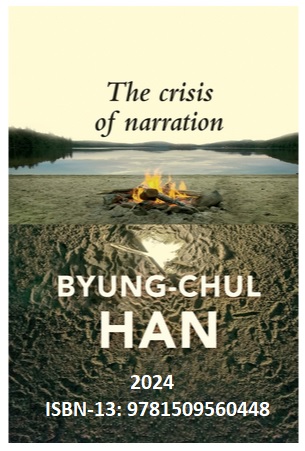
Nov 9, 2020 (Flavio Pasquino) www.youtube.com/watch?v=trZuled8Mhk
*
‘ Waar het intussen in dit geval van Pasquino – wijkagente om gaat, is de vraag of we bij voorbaat (moeten, willen) uitsluiten dat de wijkagente Pasquino wilde intimideren (en tegelijkertijd waarschuwen). Dat is de Derridiaanse double bind: vergif en medicijn.’
- ‘ Waarom zou je zelfcensuur toepassen door een lezing uit te sluiten? De wijkagente zou zo wel kunnen willen waarschuwen alsook bedreigen en intimideren. Voor welke lezing, duiding, de beschouwer kiest, kan per situatie verschillen.’
‘ Nog niet eens zo héél erg lang geleden waren de keuzen die de meeste mensen maakten bij het duiden van informatie, tamelijk voorspelbaar. Dat is intussen anders. Narratieven zijn net als bijna al het andere, tijdelijke gebruiksvoorwerpen, niet voorstemd voor duurzaamheid en toekomstbestendigheid.’
*
citaat Byung-Chul Han; Daniel Steuer (ISBN-13: 9781509560448): The founder of the French daily newspaper Le Figaro, Hippolyte de Villemessant, expressed the essence of information in the following remark: ‘To my readers, an attic fire in the Latin Quarter is more important than a revolution in Madrid.’ For Walter Benjamin, the remark ‘makes strikingly clear that what gets the readiest hearing is no longer intelligence coming from afar, but the information which supplies a handle for what is nearest’. The newspaper reader’s attention extends only to what is near. It shrinks to mere curiosity. The modern newspaper reader jumps from one news item to the next, instead of letting her gaze drift into the distance and linger. The modern reader has lost the long, slow, lingering gaze.

A piece of news that is embedded in a story has an altogether different spatial and temporal structure from that of information. It comes ‘from afar’ . This distance is its characteristic trait. Modernity is characterizedb y the progressive demolition of farness, the place of which is taken by gaplessness. Information is a genuine expression of a gaplessness that makes everything available. A piece of news that arrives is marked by an unavailable distance. It announces a historical event that resists availability and computability. We are at its mercy, as if faced with the power of destiny. Information does not survive the moment it is registered: ‘It lives only at that moment; it has to surrender to it completely and explain itself to it without losing any time.’
*
uit wikipedia: In his essay “Plato’s Pharmacy”,[3] Jacques Derrida deconstructs several texts by Plato, such as Phaedrus, and reveals the inter-connection between the word chain pharmakeia–pharmakon–pharmakeus and the notably absent word pharmakos. In doing so, he attacks the boundary between inside and outside, declaring that the outside (pharmakos, never uttered by Plato) is always-already present right behind the inside (pharmakeia–pharmakon–pharmakeus). As a concept, Pharmakos can be said to be related to other Derridian terms such as “Trace.’